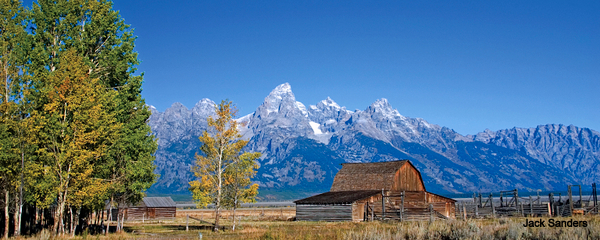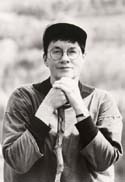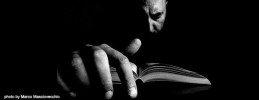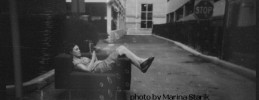
Photo by Jack Sanders
by Julie Singleton

Annie Proulx cuts a formidable figure with her fierce intellect and desire for precision. She lives close to the Medicine Bow Mountains, eschewing urban life and its narrow viewpoints for the open vistas of Wyoming. Landscape provides the essential backbone to both her fiction and non-fiction: characters and stories seem to roll out of the mountain ranges of Wyoming and the wind-battered coastline of Newfoundland.
Proulx was born in Connecticut on 22 August 1935, the eldest of five sisters. Her father was of French-Canadian lineage and was an ambitious man, working his way up from bobbin boy in the cotton mills of Rhode Island and Connecticut, to vice president of a textile mill. Proulx credits her keen powers of observation to her mother, who was an amateur painter, and recalls the family’s annual camping trips to Maine, which instilled in her a lifelong love of rural life. Both Proulx’s novels and short stories emanate from the rural landscape, and she often paints a scene to engrain its detail in her mind for later transformation into prose.
In 1955, at the age of twenty, Proulx dropped out of college to marry H. Ridgeley Bullock. They have one daughter, Sylvia, who went to live with him when the couple divorced. Following a second, short-lived marriage, Proulx married for the third time in 1969, and had three sons: Jonathan, Gillis and Morgan. Proulx later reflected in an interview with the Paris Review that she: ‘could not operate in a conventional family…..I back away from life, I observe it. The jolly family circle and loving husband: those things are not for me.’
Following an amicable divorce, Proulx returned to university in Vermont, before continuing on to study towards a PhD at Montreal, her favourite university. Her disillusion with academic life led her to abandon her research in favour of the rural haven of Vermont, where she carved out a living writing ‘how-to’ articles for ‘hook and bullet’ (fishing and shooting) magazines. In an interview with BBC’s Omnibus, Proulx describes these years and her mounting desire to create more imaginative, looser characters and stories that escaped the straitjacket of journalism.
Proulx’s departure into fiction began in her fifties, when her youngest child started school, with the publication of her first short story collection Heart Songs (an old phrase for country and western music) in 1988, which explores the rural traditions and rituals of small-town life in New England. Her laconic style and figurative language attracted both ardent admirers and vehement detractors, who accused her of pretentiousness.
Four years later, Proulx published her first novel Postcards which won the PEN/Faulkner award. Her next novel, The Shipping News, followed the exploits of the hapless Quoyle, a third-rate newspaper reporter, and evoked the harshness and raw beauty of Newfoundland, winning the Pulitzer Prize and the National Book Award. The novel was later made into a Hollywood film.
Although she published two further novels – Accordion Crimes (1996), an ambitious and wide-sweeping novel, and That Old Ace in the Hole (2002) which chronicles the exploits of naïve city boy, Bob Dollar, a scout for a hog-farming conglomerate – Proulx regards her short fiction as a greater accomplishment. Her love of the short form derives from her delight in the weight of every word and the way the expression of big ideas is possible in a small space. For this reason, Proulx believes that new writers should ‘cut their teeth’ with novel writing before attempting the complexities of the short story form.
Accordingly, Proulx’s trilogy of Wyoming stories, Close Range (1999), Bad Dirt (2004), and Fine Just the Way It Is (2008), are regarded as her finest work. Proulx’s award winning short story ‘Brokeback Mountain’ from Close Range was made into an Oscar nominated movie, and ‘The Wamsutter Wolf’, collected in Bad Dirt, won the Aga Khan prize for fiction. Proulx’s affinity to Wyoming drew her to set up home there, and Bird Cloud, her autobiographical account of the design and construction of her home, will be published in 2011.
Proulx is drawn to large-scale themes, in particular the dichotomy between rural life and centres of power within the city. In an interview with BBC’s Omnibus she observes that rural people rarely have a hand in decisions that affect them deeply. Accordingly, her stories in the Wyoming collection chronicle the disbanding of North American rural life and the struggle for survival of farmers, labourers and ranchers in an unforgiving environment. Like Proulx herself, these stories are neither nostalgic nor sentimental: Proulx does not seek to recreate the past, but to evoke present day rural life and its pre-occupations. The stories are often brutal and unforgiving but are never entirely dark – the bitter pill is laced with humour. Proulx also finds beauty in the mundane and the ordinary-transforming the familiar so that it becomes new.
Proulx is fascinated by the ‘extreme’, recognizing that extraordinary places have the tendency to create unusual people. The outlandish names of her characters–Hawkwheel, Dakota Hicks, Chauncey Mellowhorn–seem to be hewn from the rugged landscape of Wyoming. Her laconic style also appears to come from the landscape with its short, uncomplicated sentences, truncated style and unusual adverbs and adjectives.
An antidote to the mythologising of the modern West, Proulx’s work is grounded in the gritty realities of North American rural life. The study of history, change and dissolution are a major focus of her work, but Proulx remains a storyteller at heart. Her love of language and the shape of stories mark her as one of the most distinctive and exuberant writers of her generation.


Thank you so much Jan – I am glad you enjoyed the article, which was a joy to write as I am an ardent admirer of Proulx.
Enjoy the site!
I have just joined thresholds and this is the first thing that I have read. What a great start as I found this article to be truly inspiring. This has made me want to read more of Julie Singleton’s observations of another author. She has captured the essence of the authors fascinating journey through life, and given the reader a snapshot of her somewhat eccentric way of making use of her experiences through her larger than life characters.
Jan Hawkins BA(Hons) University of Chichester
Hi Jan, and welcome to THRESHOLDS. We’re glad you found us! It’s a great piece isn’t it. I’ve passed your comments on to Julie, and we too look forward to hearing more from her!
Julie’s next Author Profile will be of Ali Smith – so keep checking back!